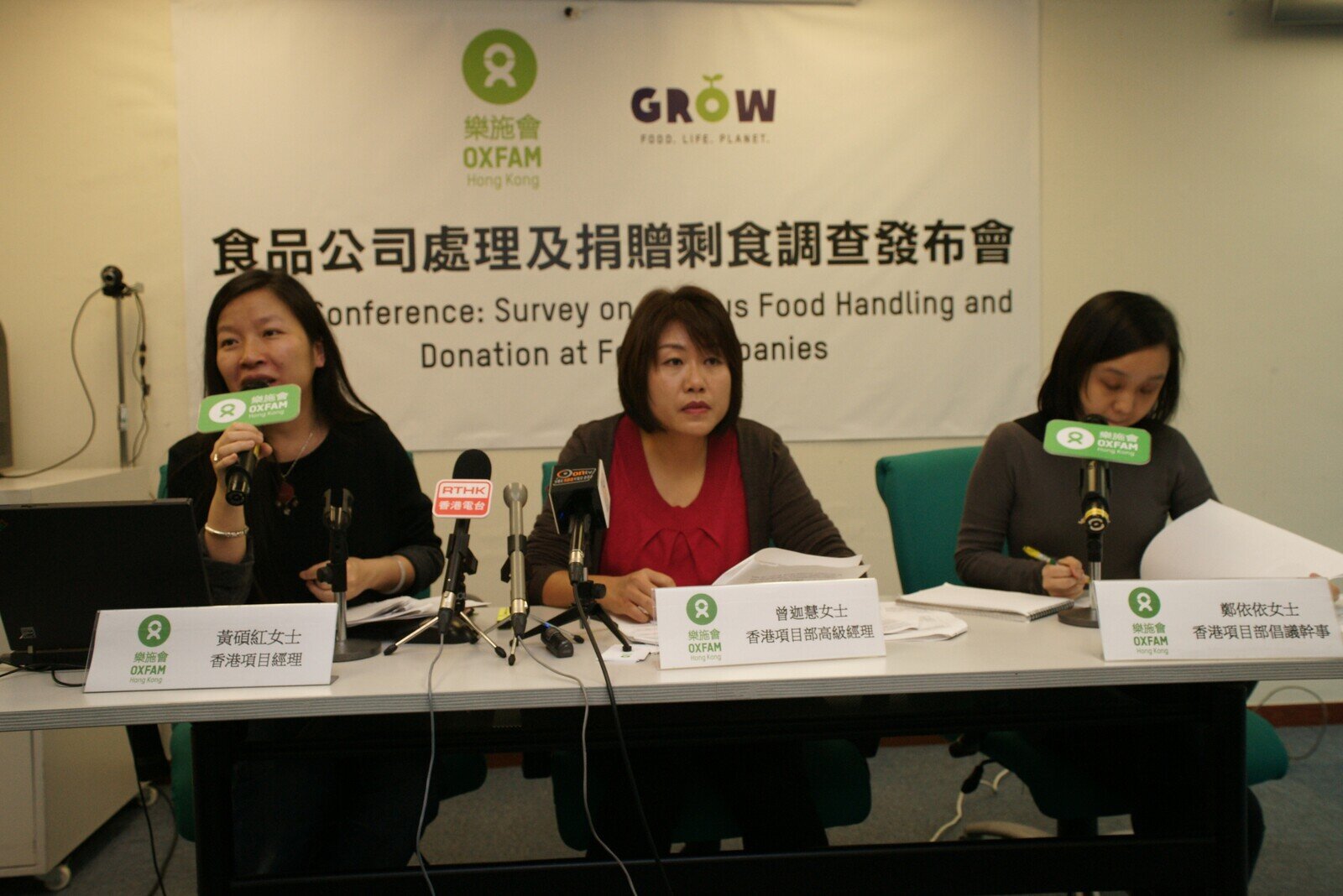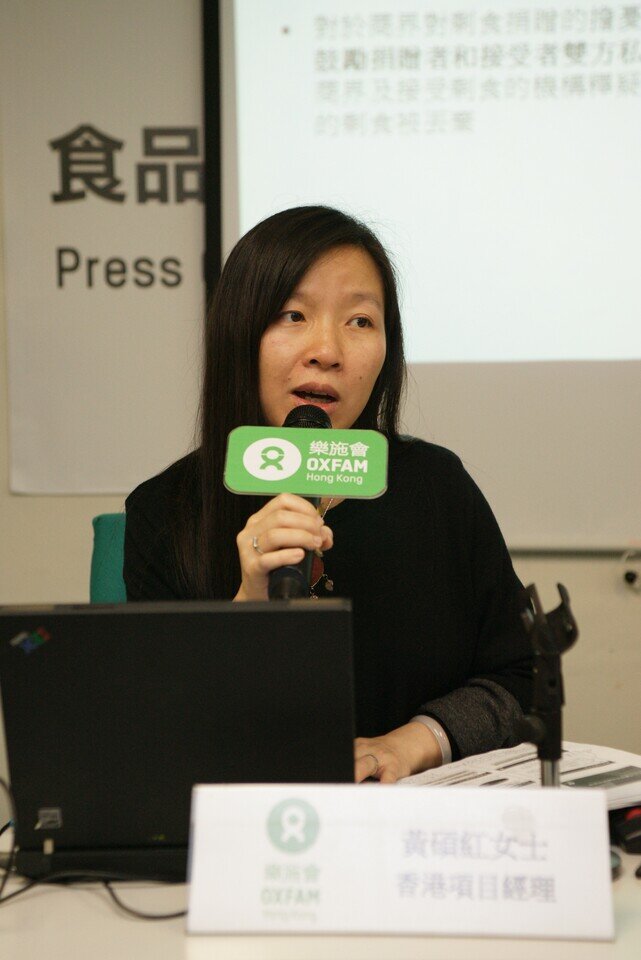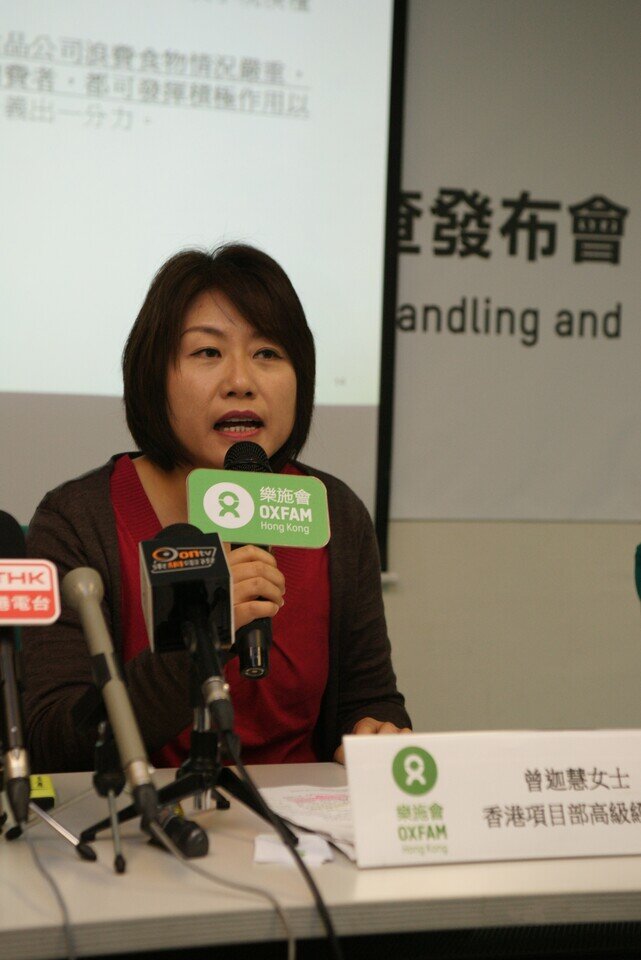17 FEB 2014
70% of food companies habitually discard their surplus food
Oxfam urges food companies to donate their surplus products so that poor families no longer have to go hungry.
Oxfam launched the GROW food justice campaign at the end of 2011 in the hope of fixing the world’s broken food system. Globally, we produce 6 billion tonnes of agricultural material, of which 1.3 billion is edible products which go to waste. In Hong Kong alone, we send 3,584 tonnes of food waste to landfills every day, 30 per cent of which comes from the food and beverage industry. The benefits of using surplus food are twofold: First, doing so can reduce greenhouse gas emissions from landfills and hence be more sustainable. Second, by delivering surplus food to poor families, we are helping to alleviate poverty. For these reasons, Oxfam is publishing this report, titled “Surplus food handling and donation at food companies”. With it, the agency hopes to understand how the food and beverage industry handles surplus food and its views on donating it, so that it can make policy recommendations to the government and those in the sector.
Food wastage represents a serious issue among retail chains, with many discarding items simply because they look “unattractive”.
Oxfam commissioned Policy 21 last September to conduct a survey which has now resulted in this report. Policy 21 interviewed 353 food businesses, including 225 convenience stores and prepackaged food chains, and 128 food manufacturers and distributors. Although 84.6 per cent of the food companies say they have measures in place to use their surplus food or reduce its volume, 66.3 per cent still discard their excess products. This shows that these companies have not fully implemented their policies to cut down on food waste.
The categories of surplus food that the largest proportion of retail chains report having are bread (84.9%), cake (80.9%) and microwave food (60.4%). Ninety per cent of those with surpluses in these categories discard them as one method of dealing with them. This shows that wastage is a serious issue.
The categories of surplus food that the largest proportion of food manufacturers report having are grain products (61.6%), frozen meat (20.9%) and vegetables (12.6%). For food distributors, those figures are 27.2, 24.5 and 20.1 per cent, respectively. Half of the manufacturers and distributors with surpluses in these categories discard them as one method of dealing with them.
The food industry often categorises food as surplus products when they look “unattractive”. Sixty per cent of food manufacturers and distributors classify meat as a surplus product when it has an “unattractive appearance”, and 66.9 per cent do so for vegetables. Most of these items end up getting thrown out.
Also, 90.4 per cent of respondents do not donate their surplus food to food banks or charities that collect and redistribute food. Of them, 67 per cent say they are worried about the product liability issues related to donating food.
Based on the data in this survey, the value of the surplus products at food companies in Hong Kong is estimated at $60 million per year. To put that into context, that roughly equals the cost of preparing 3 million soup kitchen meals at $20 each.
The survey shows that food companies have not fully implemented policies to cut down on food waste. As for the government, it has not provided any substantial support. For these reasons, Oxfam would like to present the following recommendations to the government, the food industry and consumers.
Oxfam’s recommendations for the government, food companies and consumers
1. Consider practices abroad and establish principles on reducing food waste and using surplus products.
Oxfam referred to the United States Environmental Protection Agency’s food recovery hierarchy to create its own GROW zero waste food recovery hierarchy (see appendix 1). The hierarchy’s purpose is to maximise the nutritional utility of food. First in order of priority is reducing wastage at its source. Food manufacturers should prepare only as much food as appears on their orders from their customers to prevent wastage. They should donate the food that they cannot sell, but which remains edible, to food banks and charities that collect and redistribute food, or send it to soup kitchens so they can turn it into meals for low-income members in our community who cannot feed themselves due to financial difficulties. If food companies use this method, they should be able to dispose of most of their excess inventory. If they still have products remaining after this, they can consider using them as fodder or fertilisers. Sending the food to incinerators and landfills should only be considered as a final option.
2. Companies should establish a policy of zero food waste.
Oxfam recommends companies establish zero food waste policies, issue clear guidelines to employees on how to achieve this goal, and check their inventories regularly. Food companies should donate food as early as is feasible, and establish strong relationships with food collection and redistribution organisations, instead of treating surplus items as garbage.
3. The government should take the lead in setting up a system for collecting donated food and redistributing it to food banks and charities at the district level.
The government should take the lead in cutting down on food waste. It should support organisations working toward this goal and, according to the principles above, create a matching system to link up food companies that have surplus products with charities in the same districts that collect food. The government should increase its support for food banks and charities so that there will be more programmes to collect and use surplus food. It should also do more work in promoting these organisations as part of the Food Wise Hong Kong campaign, in order to increase the public’s and the food industry’s understanding of how surplus items can be collected and used.
4. The government should clarify the issue of product liability for donated food to encourage food companies to donate their surplus products.
To address the concerns and considerations that businesses may have regarding donating their surplus food, Oxfam recommends the government consider the possibility of forming legislation to encourage food donations. The government should clarify the issue of product liability on donated food and encourage the food industry to donate its surplus products.
5. Consumers should purchase only as much as they need and monitor how food companies handle their surplus items.
Oxfam’s GROW Methods comprise principles for food consumption that we can use in our daily lives. People are encouraged to cut down on food waste and to live more sustainably in order to create a world where everyone always has enough to eat. One of those methods is saving food, and we call on consumers to put this into practice by purchasing only as much as they need and making good use of their leftovers. Consumers can also place public pressure on food companies by joining Oxfam in monitoring how they handle their surplus food and urging them to make improvements.
Appendix 1

Oxfam referred to the US Environmental Protection Agency’s food recovery hierarchy and created one suited to Hong Kong: the GROW food recovery hierarchy. The hierarchy aims to maximise the nutritional utility of food.
Download Executive Summary
Download Full Report
About Oxfam
Oxfam is a world-wide development organization that mobilizes the power of people against poverty.
For media enquiries, please contact:
Kit Chau
Assistant Communications Officer
Tel: +852 3120 5272
Email: [email protected]
Wong Shek Hung
Hong Kong Programme Manager
Tel: +852 3120 5279
Email: [email protected]
(From left) Oxfam Hong Kong Programme Manager Wong Shek-hung, Hong Kong Programme Unit Senior Manager Kalina Tsang and Hong Kong Programme Campaigns Officer Debby Cheng Yi-yi said 90.4 per cent of the food companies that responded to the survey did not donate their surplus food to food banks or charities. Of these, 67 per cent said the reason was because they were worried about product liability issues.
2. Hong Kong Programme Manager Wong Shek-hung said a lot of products get categorised as surplus food when they have an “attractive appearance”, and that most of these items simply get thrown out.



